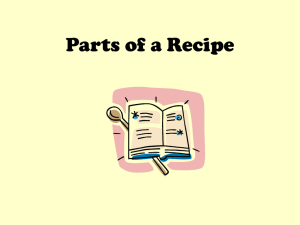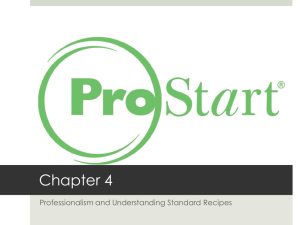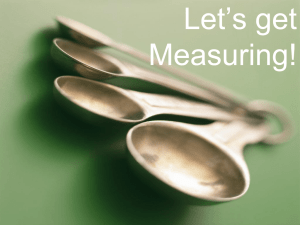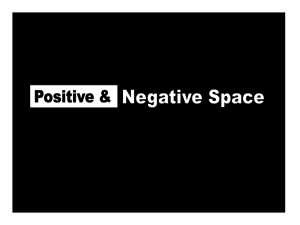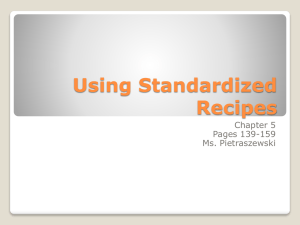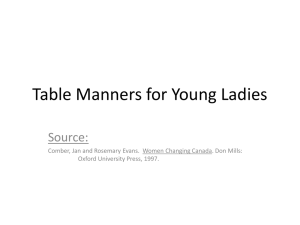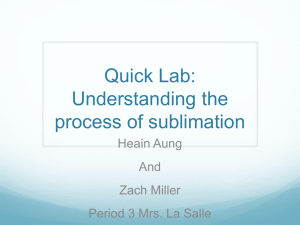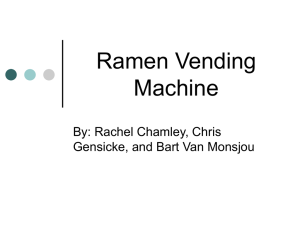Reading and Using Recipes PowerPoint Presentation
advertisement
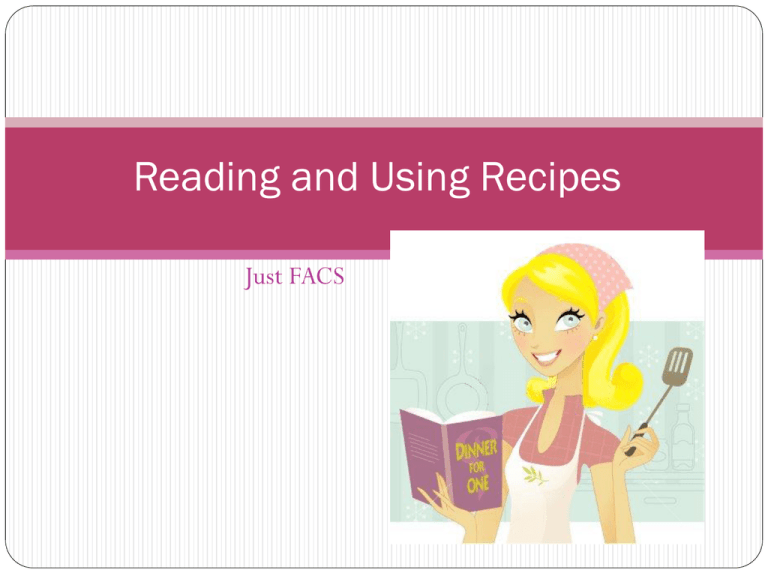
Reading and Using Recipes Just FACS What is a Recipe? A set of directions for making food or beverage. A recipe includes: Ingredients Directions Prep Time Cook Time Nutritional Facts (Optional) PASTA RECIPES Miracle Lasagna Servings: 6 Prep Time: 5 minutes Cook Time: 1 Hr 5 min Ingredients: •1 (26 ounce) jar Prego Traditional Italian Sauce •6 uncooked lasagna noodles •1 (15 ounce) container ricotta cheese •2 cups shredded mozzarella cheese •¼ cup grated Parmesan cheese Directions: 1. Spread about 1 cup pasta sauce in 2-quart shallow baking dish (11x7-inch). Top with 3 uncooked noodles, ricotta cheese, 1 cup mozzarella cheese, Parmesan cheese and 1 cup pasta sauce. Top with remaining 3 uncooked noodles and remaining pasta sauce. Cover. 2. Bake at 375 degrees F for 1 hour Uncover and top with remaining mozzarella cheese. Let stand 5 minutes. How to Use a Recipe Read all directions thoroughly before beginning. Gather all needed equipment and ingredients. Preheat and/or complete other pre-preparation steps. Follow directions step by step. Common Abbreviations Abbreviation Here are some common abbreviations that you will find in most recipes. Meaning tsp. or t. Tbsp. or T. c. or C. teaspoon tablespoon cup pt. qt. oz. pint quart ounce lb. or # °F pound Fahrenheit Hr hour min. minute Measuring for Recipes: Dry Ingredients Spoon ingredient into measuring cup until it is overfilled. (When measuring brown sugar, pack it into the measuring cup with the back of the spoon.) Use a straight-edge spatula to level off any excess. Measuring for Recipes: Liquid Ingredients Set a liquid measuring cup on a flat surface. Bend down so the desired measurement marking is at eye level. Slowly pour the ingredient into the measuring cup until it reaches the mark for the desired amount. Measuring for Recipes: Fats Use a rubber spatula to press fats into a dry measuring cup, making sure to eliminate any air pockets. Overfill the measuring cup. Level it with a straight-edged spatula. Equivalents Cups Fluid Oz. Tbsp. Tsp. 1 cup 8 oz. 16 Tbsp 48 tsp ¾ cup 6 oz. 12 Tbsp 36 tsp 2/3 cup 5 1/3 oz. 10.6 Tbsp 32 tsp ½ cup 4 oz. 8 Tbsp 24 tsp 1/3 cup 2 2/3 oz. 5.3 Tbsp 16 tsp ¼ cup 2 oz. 4 Tbsp 12 tsp 1/8 cup 1 oz. 2 Tbsp 6 tsp 1/16 cup ½ oz. 1 Tbsp 3 tsp 1 pint 2 cups 4 cups 1 quart 4 quarts 1 gallon Adjusting Recipes When changing the yield of a recipe, use the measuring equivalents to figure the adjusted amounts of each ingredient before you begin cooking. Write the adjusted amounts on your recipe so you will remember them as you work. To adjust recipes you want to use the following formula: Want/yield = multiplying factor Take the multiplying factor and multiply it by each ingredient amount. Recipe Adjusting Example Miracle Lasagna from slide 3 It yields 6 and I need it to feed 18 18/6=3 (multiplying factor) Take 3 and multiply by each ingredient 1 jar of Prego (3)=3 jars of Prego 6 lasagna noodles (3) = 18 lasagna noodles 2 cups shredded mozzarella (3) = 6 cups of mozzarella ¼ cup of grated Parmesan (3) = ¾ cup of grated Parmesan Recipe Writing Activity Write down your favorite recipe including everything you think is needed to prepare, how to prepare and how long it takes. Next, find the real recipe either online or in a cookbook and compare the real recipe to your recipe. What was the difference? What were you missing? Why is it important to have an accurate recipe when preparing food?

